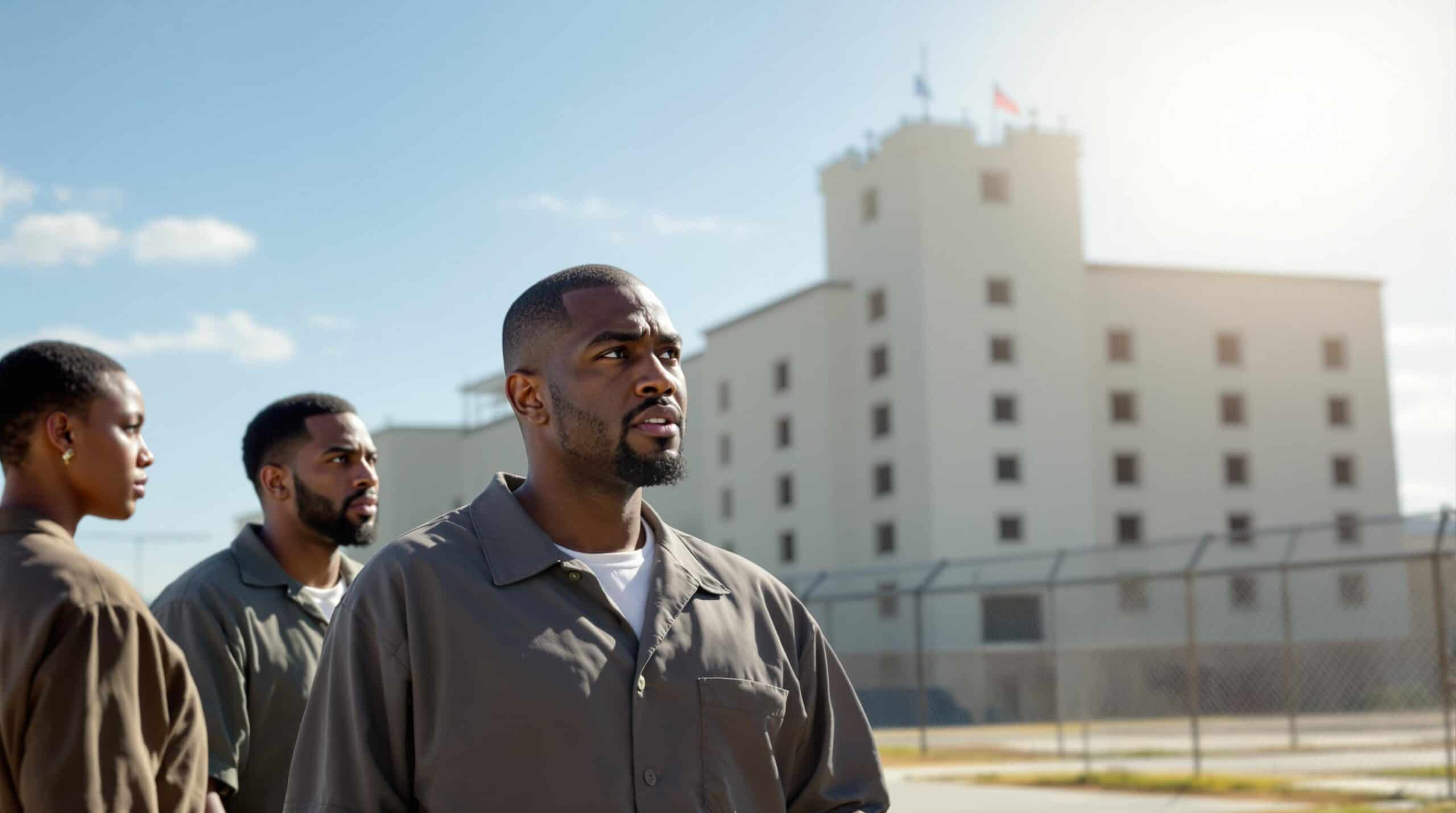- Georgia’s prison crisis: Over 142 homicides from 2018-2023, with 35 in 2023 alone, highlight rampant violence, drug abuse, and severe understaffing. Some facilities report vacancy rates exceeding 60%.
- DOJ declares unconstitutional conditions: Investigations reveal gang control, unchecked violence, and neglect of vulnerable inmates, including LGBTQ+ individuals.
- Major legal cases:
- DOJ Investigation: Exposed systemic failures like understaffing and contraband issues.
- Fulton County Jail Rights Case: Found poor living conditions and risks for LGBTQ+ inmates.
- Mental Health Lawsuit: Focused on solitary confinement misuse and lack of psychiatric care.
- Special Management Unit Review: Highlighted overuse of solitary confinement and poor sanitation.
- Healthcare Class Action: Addressed severe medical neglect and unsanitary conditions.
These battles demand urgent reforms in staffing, safety, medical care, and constitutional protections for inmates. Advocacy groups like Georgia Prisoners’ Speak amplify the push for systemic change.
DOJ Finds Unconstitutional Risk of Harm Inside Georgia Prisons
1. DOJ Investigation of Georgia Prison System
In September 2021, the Department of Justice (DOJ) launched a statewide civil rights investigation into Georgia’s prison system. This marked a major legal challenge to the state’s correctional facilities, uncovering violations of prisoners’ Eighth Amendment rights, which protect against cruel and unusual punishment [1].
The investigation revealed deep-rooted issues within the system. Chronic understaffing allowed gangs to gain control over many prison units, even taking over administrative duties like bed assignments. Security failures were evident, with contraband flowing freely into facilities. Prison officials were found negligent in addressing these persistent problems [1].
"We can’t ignore the violence and wretched conditions in these institutions", said Assistant Attorney General Kristen Clarke [1].
The DOJ has warned Georgia to implement immediate reforms or face legal action. Key priorities include fixing staffing shortages, improving security, and safeguarding vulnerable inmates. Advocacy groups like Georgia Prisoners’ Speak (GPS) have played a key role, providing firsthand accounts from incarcerated individuals to support the investigation [2].
While the DOJ’s findings focus on systemic failures, other legal efforts have targeted specific rights violations, such as those at Fulton County Jail.
2. Fulton County Jail Rights Case
An investigation into Fulton County Jail uncovered serious constitutional violations, such as poor living conditions, excessive use of force, and a lack of essential services. One of the key issues identified was chronic understaffing, which has made it nearly impossible to maintain even basic safety measures.
The report also shed light on the heightened risks faced by LGBTQ+ inmates. A flawed classification system has left this group especially vulnerable to sexual violence and assault, highlighting a failure to protect those at greater risk – a direct violation of their constitutional rights.
To address these issues, the investigation called for immediate changes. These include hiring more staff, implementing stronger safety measures, overhauling the classification system, and expanding access to medical and mental health care. These steps aim to close the gaps in inmate safety and care that have long plagued the facility.
This case has brought much-needed attention to the conditions in Georgia’s correctional facilities. The problems at Fulton County Jail reflect broader challenges across the state, as seen in other high-profile legal disputes. It has sparked renewed calls for comprehensive prison reform in Georgia.
sbb-itb-7858f51
3. Georgia Advocacy Office v. Jackson

This lawsuit highlights allegations that the Georgia Department of Corrections (GDC) has consistently failed to provide proper mental health care, violating the Eighth Amendment’s ban on cruel and unusual punishment. Central to the case were claims about the excessive use of solitary confinement for mentally ill inmates and a severe lack of mental health professionals.
The court ordered several reforms to address these issues:
| Reform Area | Action Required |
|---|---|
| Mental Health Services | Increase staffing and ensure better access to psychiatric care |
| Solitary Confinement | Limit the isolation of inmates with mental illnesses |
| Crisis Response | Strengthen emergency mental health intervention protocols |
The consequences of insufficient mental health care have been severe. Between 2018 and 2023, over 142 homicides were attributed to systemic understaffing and inadequate care [1][3]. The lack of mental health professionals has left many vulnerable inmates without the treatment they need, exacerbating their struggles.
The Georgia Prisoners’ Speak (GPS) initiative has shed light on these conditions through personal accounts from those incarcerated. Their efforts have played a key role in exposing the challenges faced by inmates with mental health issues [2].
The court’s rulings in this case have established new benchmarks for prison reform, reinforcing that proper mental health care is a constitutional obligation. These decisions directly impact prisoner safety and rehabilitation, making it clear that neglecting such care is not acceptable.
This case highlights the deep-rooted problems in Georgia’s prison system, from chronic understaffing to the disregard for basic inmate rights. While mental health care reform has been a primary focus, other legal challenges continue to address the treatment of inmates in specialized units.
4. Federal Review of Special Management Unit
A federal review of Georgia’s Special Management Unit (SMU) revealed alarming issues, including the overuse of solitary confinement without proper procedures. The Department of Justice highlighted several areas that require immediate attention:
| Area of Concern | Suggested Changes |
|---|---|
| Staffing Levels | Add more security and medical personnel |
| Living Conditions | Ensure better sanitation and amenities |
| Programming Access | Provide educational and rehab programs |
| Medical Care | Improve access to healthcare services |
| Due Process | Create clear placement and review protocols |
"Prison should not equate to torture or death", said Assistant Attorney General Kristen Clarke [1].
Despite these findings, the Georgia Department of Corrections has largely dismissed the concerns, claiming their practices align with constitutional standards – even in the face of clear evidence to the contrary [1]. This gap between their statements and the documented reality has led to heightened federal oversight and calls for swift action.
The review emphasizes the need for better oversight, staff training, inmate placement guidelines, mental health care, and reporting systems. These measures aim to fix the deep-rooted problems contributing to the current state of Georgia’s prisons. Similar issues have been identified in other facilities under federal investigation [3].
5. Prison Medical Care Class Action
The Prison Medical Care Class Action, spearheaded by the Southern Center for Human Rights (SCHR) and Kilpatrick Townsend & Stockton, LLP, takes aim at widespread healthcare neglect at Georgia State Prison (GSP). The lawsuit sheds light on severe medical neglect and unsanitary conditions impacting inmates [4].
Key Issues and Their Impact
| Healthcare Violation | Impact on Inmates |
|---|---|
| Lack of Adequate Healthcare Staffing and Access | Delays or outright denial of necessary treatments, leading to worsening conditions |
| Gaps in Mental Health Care | Serious mental illnesses left untreated |
| Poor Hygiene and Unsanitary Living Conditions | Higher risk of infections and disease |
This lawsuit goes beyond individual grievances, exposing systemic shortcomings within the Georgia Department of Corrections (GDC). It calls for a court-mandated overhaul of healthcare services, including improvements in staffing levels, safety protocols, and access to medical care. While the Georgia Department of Corrections argues that its practices meet constitutional standards [1], findings from the Department of Justice (DOJ) contradict these claims, pointing to extensive violations of the Eighth Amendment’s ban on cruel and unusual punishment [3].
The case also ties into broader reform efforts, with groups like Georgia Prisoners’ Speak (GPS) playing a key role in bringing these issues to light through firsthand accounts and documentation [2]. This legal action highlights the urgent need for meaningful reforms throughout Georgia’s prison system, echoing themes seen in other ongoing lawsuits.
Conclusion
Georgia’s five major legal battles over prison conditions reveal deep-rooted issues that demand immediate attention. These cases highlight recurring problems like severe understaffing, poor medical care, and violations of constitutional rights. The Department of Justice’s investigations often contradict the Georgia Department of Corrections’ claims of compliance, particularly in protecting vulnerable inmates and ensuring basic services.
Advocacy groups such as Georgia Prisoners’ Speak (GPS) play a critical role in shedding light on these failures and demanding accountability. As BT, GPS’s spokesperson, aptly states:
"Strategic indifference is no policy for public safety or rehabilitation" [2].
These legal challenges, combined with grassroots advocacy, have significantly increased pressure for change. Georgia’s incarceration rate of 570 per 100,000 people starkly surpasses the national average of 431, emphasizing the pressing need for reform [2].
Achieving meaningful change will take more than court rulings – it requires sustained advocacy, transparency, and public involvement. The ongoing efforts of legal organizations, advocacy groups, and platforms like GPS remain crucial in exposing violations, amplifying inmate voices, and pushing for a prison system that upholds constitutional rights and basic human dignity. These battles serve as a powerful reminder of the need for systemic change.
